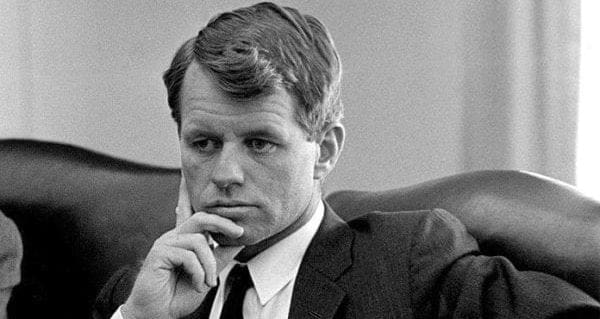 Coincident with the 50th anniversary of U.S. Sen. Robert F. Kennedy’s murder, I wrote a column several weeks ago wondering whether he’d have otherwise been elected president in 1968.
Coincident with the 50th anniversary of U.S. Sen. Robert F. Kennedy’s murder, I wrote a column several weeks ago wondering whether he’d have otherwise been elected president in 1968.
My sense was negative. In fact, I didn’t think he’d have won the Democratic nomination that year.
However, that doesn’t mean that his presidential prospects were permanently foreclosed. Not by a long stretch.
So what I’m going to do here is engage in a spot of alternative history. Of necessity, it’s speculative, even highly so.
If Kennedy had lived but failed to get the nomination, the outcome of the 1968 U.S. presidential election would’ve been very similar to what it was. Richard Nixon would’ve still defeated Hubert Humphrey, carrying the popular vote by a razor-thin margin while decisively winning the Electoral College.
As president, Nixon would’ve acted much the way he did in real life. But with the constant awareness of Kennedy gearing up to challenge in 1972, his level of paranoia would’ve been through the roof.
It’s generally assumed that, were it within his power, Kennedy would’ve ended American involvement in Vietnam much faster than Nixon did.
The reality may have been more complicated.
While Kennedy certainly positioned himself as an anti-war candidate, he’d also been clear about not bugging out. To quote his campaign material: “I do not want to simply withdraw or surrender in Vietnam.” And in his debate with rival Sen. Eugene McCarthy prior to the 1968 California primary, Kennedy took issue with McCarthy’s proposal for a coalition Vietnam government, arguing that it would be tantamount to forcing communism on South Vietnam.
Still, one of the advantages of being in opposition is that you can always criticize without having the responsibility of following through. So as Nixon steadily drew down American troop levels, Kennedy would’ve been able to argue that it wasn’t enough.
And come 1972, the Democratic nomination would’ve been Kennedy’s for the asking.
But I think he’d have lost to Nixon in November, however narrowly.
By election day, Nixon had effectively neutralized Vietnam as a voting issue.
The American troop level had been reduced by 90 per cent and American military deaths had dropped from around 300 per week to as few as three or four. Although Vietnam remained a powerful emotional issue on the left, the swing voters of Middle America saw Nixon as someone who’d kept his promise and was on the verge of extricating the U.S. from the conflict.
Notwithstanding Vietnam’s diminished salience, the argument is often made that Kennedy was still uniquely positioned to beat Nixon. He had, the theory goes, a special potential to appeal to restless white working-class voters. Thanks to his gutsy persona, he’d build a cross-racial coalition that blended blacks and Latinos with blue-collar whites.
Colour me skeptical.
Much of politics is tribal and the erosion of working-class whites’ traditional Democratic allegiance wasn’t accidental. They came to believe that it was no longer their party. If their interests clashed with those of the emerging Democratic constituencies – blacks and Latinos – they’d no longer get favoured treatment.
It’s easy to ascribe this disenchantment to mere racial resentment but it was more complicated than that.
Some of the hot button issues of the day – the alarming increase in crime, the rise of affirmative action and the introduction of compulsory school busing to promote racial balance – did pit white working-class interests against those of blacks and Latinos. And like all liberal Democrats, Kennedy would have had to choose whose side he was on.
However, a respectable loss to Nixon in 1972 wouldn’t have permanently blighted Kennedy’s presidential prospects, particularly in light of the post-Watergate Republican disarray. And at some point, he’d have inevitably crossed political swords with Ronald Reagan.
The two did have one such encounter. In May 1967, they appeared opposite each other in a CBS TV Town Meeting of the World. In front of an audience of 15 million, Reagan’s savvy surprised virtually everyone.
As Newsweek put it, “political rookie Reagan … left old campaigner Kennedy blinking when the session ended.”
Privately, Kennedy felt the same way, wondering “Who the f— got me into this?”
Years later, though, Reagan was generous. Asked if he thought Kennedy might have been elected, he responded this way: “Who knows but I’ll tell you one thing: He’d have made one helluva president.”
Troy Media columnist Pat Murphy casts a history buff’s eye at the goings-on in our world. Never cynical – well, perhaps just a little bit.
The views, opinions and positions expressed by columnists and contributors are the author’s alone. They do not inherently or expressly reflect the views, opinions and/or positions of our publication.

